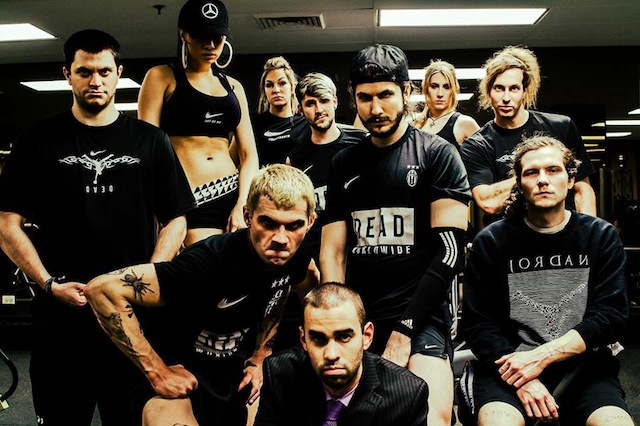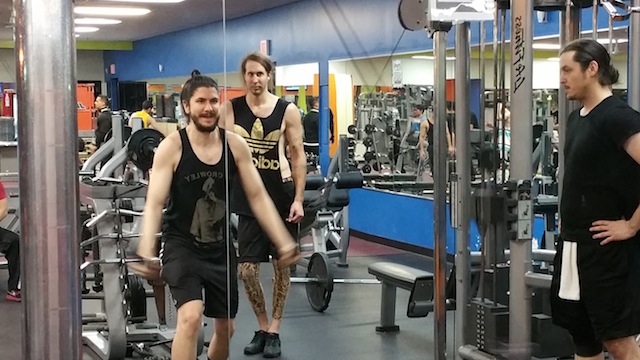Tracing Healthgoth's Roots To Chicago: An Interview With Johnny Love
By Robert Martin in Arts & Entertainment on Jan 6, 2015 8:00PM

Johnny Love (center with backwards baseball hat) poses with fellow Healthgoth aficionados, photo via Healthgoth
If the internet’s first instinct is to dissect every pixelated piece of subculture that surfaces on Tumblr, its second is to engage in an endless debate about who found it first. Who is “authentic” and who is not. Who is an artist and who is trying to make a quick buck.
This is certainly the case with Healthgoth.
The visual aesthetic/lifestyle/meme broke into the mainstream last month after The New York Times plucked it from the deepest depths of the blogosphere. Their article discussed how pale introverts from far and wide were dressing in all black to work out and snap photos of themselves—reveling in their brash opposition to meathead gym rats. The piece gave readers a sampling of health goth before concluding that the trend and its merchandise will come and go like so many others before it.
Chicago’s own Johnny Love (born John Dal Santo) is a Healthgoth.
Feeling fat at 30, the South Side native started working out and eating better about a year ago. A DJ and professional party thrower, Love felt safer in the liquor soaked surroundings of clubs like Exit than the weight room. Dressed in all black, he spent six months conquering his fear of beefcake bros and lost over 20 pounds in the process. Now, he continues to work out on a daily basis.
“It’s a fitness movement,” Love said. “A way for people who don’t feel comfortable at the gym or who are intimidated at the concept of exercising to ease into it.”
Love took Healthgoth and ran with it, inviting club friends and fellow artists to join him in his quest to “look like a greek god.”
After we spent an hour lifting weights with Love and his band of Healthgoth buddies at a Lincoln Square fitness center, it was obvious that the movement goes beyond social media sharing and t-shirt sales.
The group has a genuine passion for exercising and taking care of themselves. Over the course of ten different lifts and a lively discussion of how to get buff, Love doesn’t mention “Healthgoth.” He is just working out. The website and merchandise are side-effects of a larger ideal.
“People who do it don’t need my co-sign to be considered part of it, I’m not the pope of Healthgoth,” Love said.

Love in mid-work-out, photo by Robert Martin
The self-proclaimed “creator of Healthgoth” says he is largely self taught—reading up on a flurry of online fitness literature before he ever stepped foot in a gym. He discusses the benefits of each individual lift while demonstrating proper technique as the group works its way through the free weights area.
Back online, Love’s take on Healthgoth is a divisive one. An unaffiliated “Health Goth” Facebook group has over 20,000 members that post up dozens of unusual images of the dark and futuristic. The page approaches the term not as a fitness movement but as a bizarre visual aesthetic, grabbing photos from Tumblr that straddle a strange line between streetwear, 3-D art and robotics. The group says The New York Times got it wrong and accuse Love of shamelessly stealing their concept for his own gain before going on to flame journalism as a whole.
Similar cries for cultural authenticity were heard in 2011 when kids started dying their hair green and calling themselves sea punks.
The 31-year-old takes the criticism in stride. It’s clear he wants his vision to be more than a trend piece for the the internet to chew up and spit out. Johnny Love doesn’t care who created Healthgoth, he’s concerned with giving it meaning as a subculture. A level of credibility that a Facebook group could ever achieve. While anyone can post a photo of themselves wearing black fitness gear, that doesn’t make them part of something greater.
For Love, Healthgoth is not a fleeting piece of social media. It’s self improvement. It’s a willingness to stay healthy despite partying all the time. It’s his life.